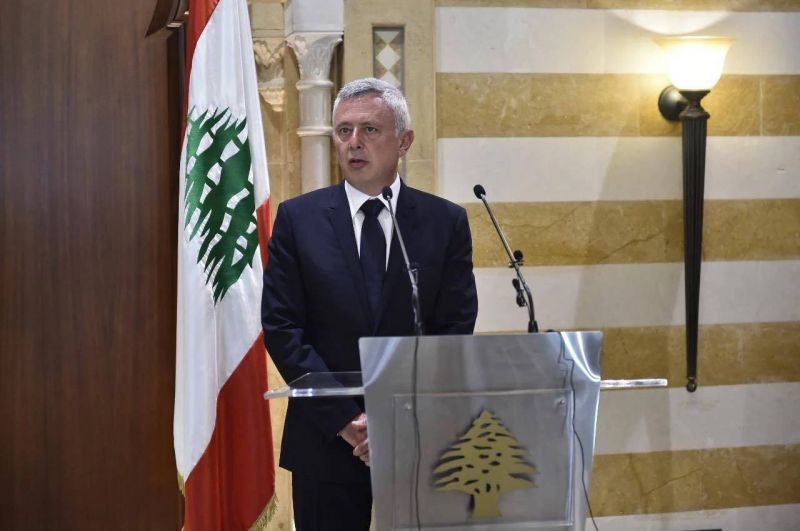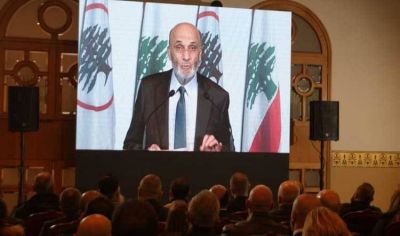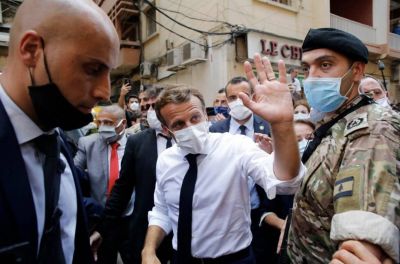
Marada Movement leader Sleiman Frangieh in Baabda. (Credit: Facebook/Sleiman Frangieh)
France is no longer merely working behind the scenes for a compromise around making Sleiman Frangieh Lebanon’s next president.
On Friday, the Marada Movement leader traveled to Paris by public invitation from Patrick Durel, adviser to the Elysée on Middle Eastern and North African affairs.
The French position has remained the same for several weeks. To break the deadlock after more than five months of a presidential vacuum, they advocate for a pragmatic approach that would see the presidency go to someone from the Hezbollah camp – such as Frangieh – and the job of prime minister go to someone from the opposing camp, such as diplomat and judge Nawaf Salam.
At a time when Saudi Arabia, a key player in the Lebanese issue, still seems hesitant to endorse this formula, Paris has decided to step up discussions with Frangieh about the guarantees he would be willing to offer in order to reassure and convince Riyadh he’s the one to ascend to Baabda.
The French proposal of a trade-off is based on an idea previously presented by the Amal Movement and Hezbollah. Initially, the idea was proposed to the Saudis just to gauge their reaction. It was later adopted by Paris but rejected by Riyadh.
The recent exchanges between these two countries on the Lebanese issue, including last week’s official phone call between President Emmanuel Macron and Crown Prince Mohammad bin Salman, did not lead to an agreement, which suggested that France might decide to move on from Frangieh.
However, according to a French diplomatic source close to the matter, “France did not ask Sleiman Frangieh to withdraw from the race. On the contrary, he was advised to continue working, including offering guarantees to Saudi Arabia.” The source spoke on condition of anonymity.
In the same vein, French officials tried to persuade the leader of the Progressive Socialist Party, Walid Joumblatt, who was in Paris last week, to support this proposal, according to a source close to Joumblatt who requested anonymity.
But Joumblatt reportedly said it was not possible, as Frangieh did not have the support of any significant Christian bloc or an Arab green light, particularly from Saudi Arabia.
“During this visit, Walid Joumblatt asked his son Teymour, one of the staunch opponents of the Marada leader’s candidacy, to accompany him so that he could present his point of view to the French and hear what they have to say,” the source added.
Before Sleiman Frangieh, it was Parliament Speaker Nabih Berri — the first to officially announce Amal and Hezbollah’s support for the Marada leader — who tried to offer guarantees to the Saudis.
When he received the Saudi ambassador to Lebanon, Walid Bukhari, on March 13, Berri praised Frangieh’s merits, according to a Saudi source who requested anonymity and confirmed by another source close to Berri. Berri reportedly presented Frangieh as the only figure capable of maintaining relations with various Lebanese parties and building bridges between Arabs, while highlighting Frangieh’s commitment to the Taif Agreement.
But Bukhari did not seem convinced. The diplomat reminded Berri that his country sees Frangieh as the candidate of a political camp — and that of the pro-Iranian Hezbollah — whose election would be perceived as the victory of one side over the other. This result would be contrary to what was decided at the meeting in Paris on Feb. 6 between representatives from France, the United States, Saudi Arabia, Qatar and Egypt.
Bukhari also argued that electing Frangieh, despite the opposition of the main Christian protagonists, would provoke them and push them to call for a divorce from other sects.
Promises made by Frangieh
According to French and Saudi diplomatic sources, Frangieh likely gave guarantees to Dural on Friday hoping the French advisor would relay them to Riyadh and persuade them to change their minds.
First, according to those same sources, Frangieh reportedly pledged that the position of prime minister would go to a candidate approved by the opposing camp and by Saudi Arabia, and promised not to interfere in the appointment of Sunni ministers in governments during his term.
He also pledged not to grant any party the blocking third, while admitting that he could not prevent two political groups from forming an alliance within the cabinet and thus blocking his actions. Cabinet would also have a free hand in carrying out economic and financial reforms and facilitating a sought-after bailout agreement with the International Monetary Fund (IMF).
Last but not least, Frangieh is said to have committed to bringing the national defense strategy — in short, the idea that Hezbollah lay down its arms — back to the table, capitalizing on the trust that Hezbollah places in him.
Regarding relations with the Syrian regime, a historic ally of the Frangieh family, he affirmed that he did not intend to depart from the Arab consensus, even proposing to play the role of mediator between Damascus and Riyadh, which could serve Saudi interests.
He also said he was ready to discuss two thorny issues with the Bashar al-Assad regime: border control to prevent smuggling and the return of Syrian refugees to their country. "Sleiman Frangieh would not have gone to Paris and offered his guarantees without a green light from Hezbollah on the issue of defense strategy, but also from Bashar al-Assad on the refugee dossier," a Hezbollah official said. That same official added that Hezbollah "is very flexible and maintains open communication channels with the French."
According to sources in the Marada Movement, the party feels confident he is making progress. Paris also seems satisfied with the guarantees offered by the candidate and plans to capitalize on them to negotiate with Riyadh, arguing that these commitments serve the strategic interests of the kingdom.
“Riyadh's opposition to this candidacy is not personal,” said a Saudi diplomatic source on condition of anonymity, due to the sensitive nature of the talks. “But electing Sleiman Frangieh would mean the victory of one camp over the other, which is not acceptable.”
“Especially since Saudi Arabia believes that he will not be able to implement these guarantees alone and that he will have to obtain explicit approval from Hezbollah and, above all, from Iran,” the source added.
“In Lebanon, there are no guarantees,” he went on. “The president is elected for a six-year term, while the prime minister and the government can be overthrown overnight.”
The French are aware of this.
For this reason, according to a French diplomat, President Macron planned to visit Saudi Arabia during his trip to China this week but ended up settling for a phone call with the Saudi crown prince, MBS.
The source added that Macron hopes that the normalization agreement signed last month between Tehran and Riyadh, thanks to Chinese mediation, will persuade the kingdom to soften its position. He could even consider discussing the Lebanese issue in Beijing, in order to push the Chinese to play the role of mediator between the two rival powers and to convince Iran to offer the necessary guarantees to Saudi Arabia.
This article was originally published in French in L’Orient-Le Jour.


